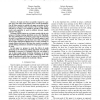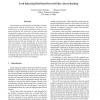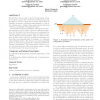234 search results - page 26 / 47 » Clustering e-commerce search engines |
WEBI
2010
Springer
13 years 5 months ago
2010
Springer
Abstract--To make sure they can quickly respond to a specific query, the main search engines have several mechanisms. One of them consists in ranking web pages according to their i...
PDP
2008
IEEE
14 years 1 months ago
2008
IEEE
Search engines use inverted files as index data structures to speed up the solution of user queries. The index is distributed on a set of processors forming a cluster of computer...
IPM
2007
13 years 7 months ago
2007
We consider a network of autonomous peers forming a logically global but physically distributed search engine, where every peer has its own local collection generated by independe...
ICSM
2007
IEEE
14 years 1 months ago
2007
IEEE
Bioinformaticists use the Basic Local Alignment Search Tool (BLAST) to characterize an unknown sequence by comparing it against a database of known sequences, thus detecting evolu...
KDD
2008
ACM
14 years 8 months ago
2008
ACM
We introduce the problem of query decomposition, where we are given a query and a document retrieval system, and we want to produce a small set of queries whose union of resulting...



